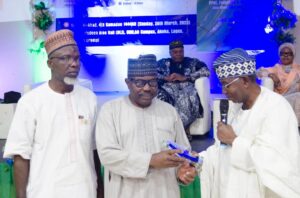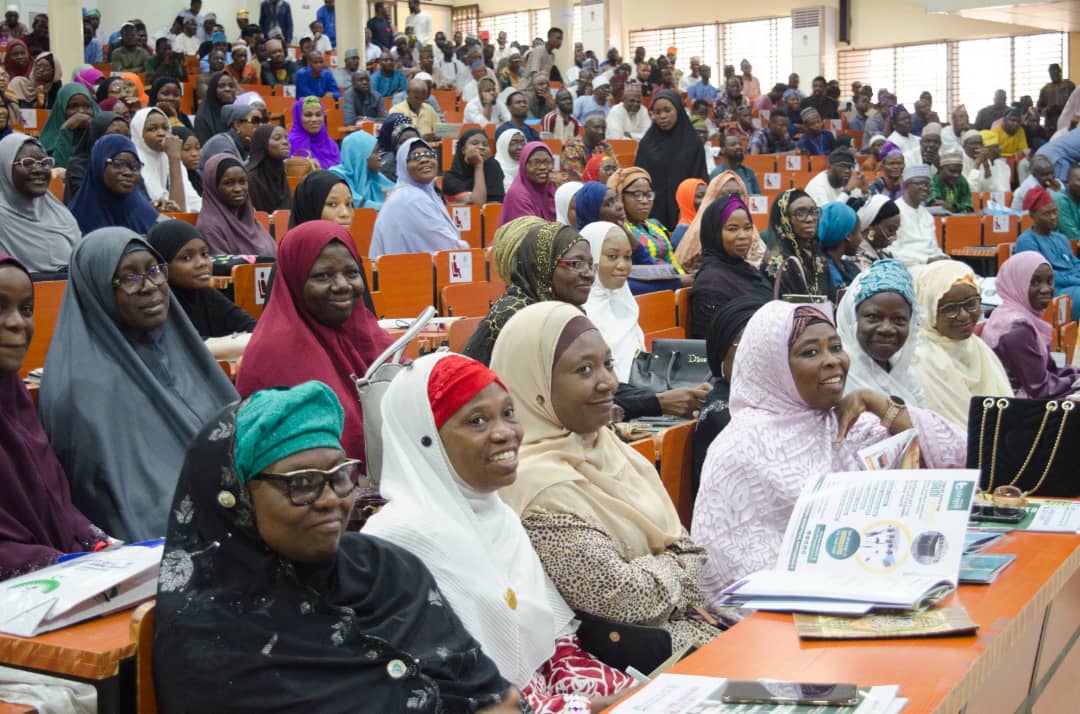Good Governance, National Transformation Dominate UMA’s 2023 Ramadan Lecture
...As Shafi'i, Banire, Obanikoro, others discussed Leadership in Islam
Razaq Bamidele
When the University of Lagos Muslim Alumni Association (UMA), held its 28th (pre-) Ramadan Lecture, Sunday, March 26, what was on the front burner was the Islamic perspective on leadership religious and political scholars in attendance brainstormed upon with a view to tackling all agents militating against proper national transformation in the country.
The event was themed: “National Transformation: Between Responsible Leaders and Responsive Citizenry,” and took place at Prof. Nurudeen Alao Hall (DLI), UNILAG Campus, Akoka, Lagos. The pre-Ramadan event was eventually held on the 4th day of Ramadan because of the rescheduled governorship and House of Assembly polls.

This is how the UMA President, Prof. Khalid Adekoya put it in his welcome address: “I am greatly delighted to welcome you most sincerely to the 28th edition of our (Pre-) Ramadan lecture taking place during Ramadan, disclosing that, “it was occasioned by the rescheduling of the gubernatorial and state assembly elections by the Independent National Electoral Commission (INEC).”
The President informed that, the theme was carefully chosen to diagnose the duties and responsibilities of leaders and the led, hoping that the conversations and resolution would deepen knowledge and assist in revolving a better society for a better Nigeria for us and generation unborn, among others.
UMA, according to its brochure, is an association of the University of Lagos (UNILAG) Muslim Graduates formed over 30 years ago with a vision to be a foremost alumni organisation creating an impact on its alma mater and the society at large.
Setting the ball of discussion rolling was a Senior Advocate of Nigeria, Dr Muiz Banire who asserted that, in Islam, leadership is a trust (Amaanah), reminding with relevant quotations from Islamic scriptures that every leader must be accountable to Allah and then the people.

Banire, who was the first Guest Speaker on the occasion said, “In Islam, a leader must first and foremost be accountable to Allah, recognising that there are certain parameters Allah has set for leadership. Leadership in Islam is amaanah. You must not breach it at any point in time. Then, you must be accountable to the people and yourself,” just as he also advocated for the promotion of rule of law without fear or favour and urged leaders to ensure that their governance is participatory.
The Senior Advocate of Nigeria, who was the former National Legal Adiser to the ruling All Progressives Congress (APC), spoke further that, as a leader, “You must equally ensure that there is justice in the land, you must ensure as a transformational leader that the resources of the country are used in the best manner and your governance, civil service must be efficient and effective.
“There must be equity and inclusiveness. You must see criticisms as a feedback mechanism, not as condemnation. These are some of the essentials that we said anyone who wants to transform society must have.”
On the followership, Banire called on the followers to obey their leaders and constituted authorities.
His words: “We must obey our leaders according to Prophet Muhammad (SAW), but the obedience is qualified. We obey them to the extent that they do not ask us to do anything that contravenes the Shari’ah. If it is going to contravene the Shari’ah, at that point, we depart.
“Again, we owe them the duty of counsel. We must draw their attention to things they are doing wrong. We owe them a duty of accountability and probity. We also have a duty not to only advise them, but also to guide them always; and most importantly, pray for them.”

On the part of the youth, the scholar cum politician encouraged them to occupy a leadership positions, admitting they have the energy and knowledge to rule.
“Prophet Muhammad (SAW) demonstrated it largely during his reign,” he noted.
In his own submission, a renowned cleric and the Grand Mufti of the Conference of Islamic Organisation (CIO) Sheikh Dhikrullah Shafi’I, who was the second guest speaker harped on the need for leaders to run inclusive administration and listen to the yearnings of the people noting that when a policy does not go down well with the people, leaders have a responsibility to rethink. He gave an instance of such a policy change thus:
“Leaders must have listening ears to hear out the needs and cries of the people to work on them. The Leader of the faithful (Amirul Mumineen), Umar Bn Khattab (RA) once made a policy to give incentives to mothers once they stop breastfeeding their children. Then, mothers in the city started hastening to stop their kids from breastfeeding.
“One night, the Amir Umar was walking round the streets in disguise when he heard the cries of a baby. He instructed the mother to breastfeed the baby but she replied that she would not benefit from the monthly incentives of the state if the baby keeps breastfeeding. So, Umar had to change the policy since it was creating a bigger danger.”
Sheikh Shafi’i also stressed the need for leaders to always keep firm on justice, reminding that, “Everyone must be brought to justice and there should be equality before the law,” just as he stated that, “our leaders must invest in security, education, healthcare and other sectors that improve the welfare of the people.”
Concluding, the CIO boss lamented that, “The major problem we are facing as a society now is because many youths outside there are idle and so Government must engage these young people meaningfully and provide them employment and empowerment opportunities.”
Chipping in his contribution at a separate interview, former Minister of Defence and Ambassador to Ghana, Senator Musiliu Obanikoro warned against blind followership believing it is high time Nigerians started challenging their leaders.
In a seperate interview with pressmen, Obanikoro expressed the conviction that, “We must be able to challenge our leaders and not treat them as god,” regretting that, “Once somebody is in public office, you see some people around behaving as if they are on a slave plantation, but hat is not the way it’s supposed to be.”
YOU MAY ALSO LIKE: https://www.thexpressng.com/spv-saga-ccb-set-to-commence-investigation-of-atiku-invites-festus-keyamo/
Going down the memory lane, the former Commissioner for Home Affairs in Lagos State said, “I had opportunity to be an ambassador representing Nigeria in Ghana. If you see the relationship between the elected officials and the people, you will be amazed compared to what you have in Nigeria! The public officeholders are very fearful of the opinion of an average Ghanaian whereas in Nigeria it is not the same. We witnessed that not too long ago. Till now, we are still experiencing it. Several people can’t find money to do transactions. The effect this will have on our economy is yet to be written. It’s going to have dire consequences on the economy of the country.”
He therefore recommended copies of the 63-page presentation of Dr Muiz Banire, SAN, made available to Nigerian leaders, believing it will remind them of why they are in public offices and how to rule by Allah’s directives.
Also contributing to the discourse was the Senator-elect for Ogun State Central District, Alhaji Shuaib Afolabi Salisu (SAS), who warned against making leadership an exclusive preserve of political class emphasising that the leadership question must never be reduced to the political class alone. Reducing the question of leadership to the political class alone, Salis warned, “will prevent us from what we require as a country to transform.”
Citing instances, the Senator-elect, who is the Chief of Staff to Governor Dapo Abiodun of Ogun State reminded tha: “Professor Ishaq Oloyede as JAMB Registrar is not a political leader, but he has provided transformational leadership in JAMB. I give you one more example. There used to be a woman called Dr Dora Akunyili. She was the DG of NAFDAC. She transformed NAFDAC. She brought the high factor in the leadership question to bear. So, don’t let us reduce leadership questions to political leadership alone. Otherwise, we will miss it out.”
He also lamented that followers in Nigeria often use the wrong metrics in assessing the performance of their political leaders, especially the legislature. “In talking about leadership, we must also ensure that the citizens themselves are also holding the leadership accountable. The electioneering process has just been completed in the country. See the language of conversation. People going to the National Assembly are being measured by how many transformers and boreholes they provide. These are not job of a legislator. But then, that’s what the bulk of people who constitute the electorate understand. Those who understand the fundamental issues that legislators are meant to provide won’t come out to vote. Therefore, we must also begin to have some national consensus about metrics to measure leadership impacts for every category of leaders.
“There is trust deficit between the leadership and the followership in Nigeria. I think the very first assignment of President Bola Tinubu is to unite the country. It’s to provide a national vision. When that happens, it will be the responsibility of everyone to ensure accountability.
“Currently, there is a disconnect between what we do to hold people accountable, the metrics of performance and those who measure performance. The elite are coming out for the very first time to know that their votes count. It’s one of the good things about this election. This election represents one of the freest, and fairest in recent times. Once we build confidence in the electoral process as we are doing, more Nigerians, more elites and more professionals will vote.
“The language of conversation will also shift from the perfunctory transformers and grinding machines, to more fundamental things for the senators and members of the House of Representatives. I look forward to an exciting 10th Senate,” Salis rounded off amid standing ovation.
The well-attended programme had in attendance prominent personalities and distinguished citizens who are alumni of the institution such as the current President, Muslim in Western Nigeria (MUSWEN), Alhaji Rasaki Oladejo; Group Managing Director, Tripple G & Co, Plc.; Rotn. Chief (Mrs ) Adebimpe Giwa, as the mother of the day; University of Iloring Vice Chancellor, Prof AbdulWahab Egbewole; Governing Council, Federal College of Education, Iwo, Osun State Nigeria, Alhaji Liadi Tella; CEO, Yinka Folawiyo Group, Alhaji Tijani Babatunde Folawiyo, who was the chairman on the occasion, ably represented by Alhaji Omobolaji Tajudeen Gaji and other high profile personalities. Also physically present was the Chief host and UNILAG Vice-Chancellor, Prof Folasade Ogunsola.


